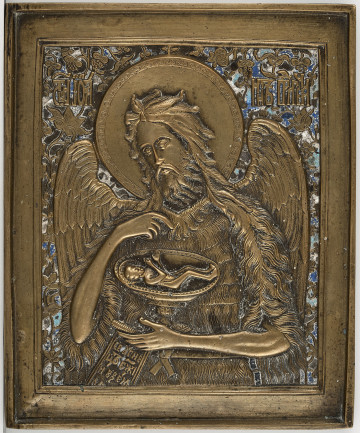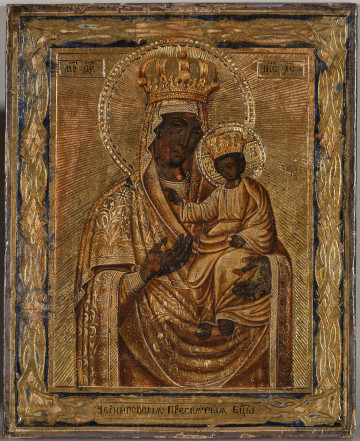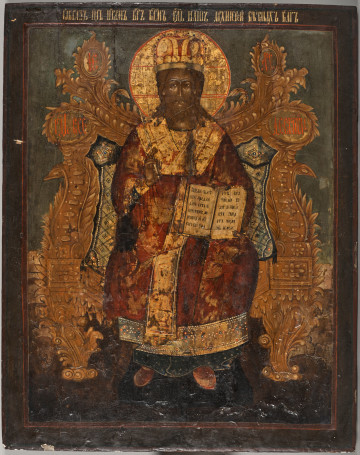
St. John the Baptist
20th century
Castle Museum in Łańcut
Part of the collection: Icons
Deesis - Christ Pantocrator The displayed portrayal of Christ in the Pantocrator the Almighty iconographic type (see S.12819MŁ) constitutes the central wing of the hinged folding icon with the depiction of Deesis, meaning meaning 'supplication', 'plea' in Greek (see S.12787MŁ; S.12802MŁ). The term formed on the basis of liturgical texts, including the Eucharistic thanks-giving prayer and supplication prayers, in which the Church resorts to the intercession of the Mother of God, John the Baptist, angels, apostles, martyrs, and saints. The visual representation of Deesis, known since the 6th-7th c., developed in several variants after the period of iconoclasm when the repression of the cult of icons ceased in Byzantium, from where the depiction spread through the sphere of Eastern Christianity. In the basic iconographic variant, in addition to the central figure of Christ, there is the Mother of God (on the right) and John the Baptist (on the left) - the greatest intercessors for humanity (see S.12824MŁ). The composition of the figures is always hierarchical. On the territory of the Russian Tsardom, which identified itself with the legacy of Rus, a movement of opponents of the liturgical reforms started by Patriarch Nikon was growing since the middle of the 17th c. The persecuted adherents of the old tradition, known as the Old Ritualists or Old Believers, developed their own centres of production of objects of worship, including cast metal folding icons or 'skladnie'. Among the diverse visual themes of the folding icons, there were the portrayals of Deesis. The displayed icon is an the example of a depiction in which the half-figures of Christ with the revering Mother of God and John the Baptist were placed separately on each of the triptych's wings (side wings not preserved). Icons such as this one, frequently used when travelling, were fastened with straps to the top bolts and worn directly on the body.
Dimensions
height: 7.9 cm, width: 6.7 cm
Object type
Icons
Technique
cast
Material
bronze
Origin / acquisition method
decyzja administracyjna
Creation time / dating
Creation / finding place
Owner
Castle Museum in Łańcut
Identification number
Location / status

20th century
Castle Museum in Łańcut

19th (?) century
Castle Museum in Łańcut

1800 — 1850
Castle Museum in Łańcut
DISCOVER this TOPIC
Castle Museum in Łańcut
DISCOVER this PATH
Educational path